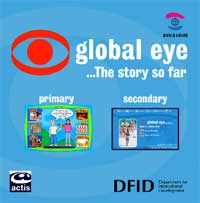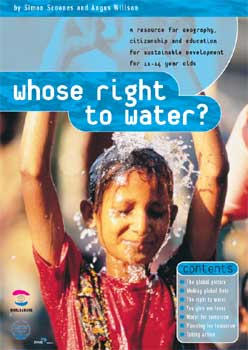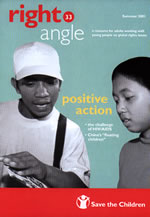|

Reviews/Supplementary Resources &
Websites/Credits
| As
DFID funding for Global Eye ends with this
edition Worldaware is seeking alternative
financial support to retain a free resource.
In the meantime, look out for the web-based
edition of Global Eye in Spring 2003 at www.globaleye.org.uk!
|
|
| The
Global Eye CD-ROM and copies of Global Eye
magazine (the print version of the secondary
school website) are available for purchase
from Worldaware.
 The
CD-ROM allows you to access every edition
of www.globaleye.org.uk and the respective
teachers' notes up to Spring 2002 on a stand-alone
computer or school intranet. It is available
for £15 (incl site licence) from http://www.worldaware.org.uk/(code
no. PA-171) The
CD-ROM allows you to access every edition
of www.globaleye.org.uk and the respective
teachers' notes up to Spring 2002 on a stand-alone
computer or school intranet. It is available
for £15 (incl site licence) from http://www.worldaware.org.uk/(code
no. PA-171)
A class
set of 30 copies of any edition or combination
of editions of the magazine cost £10.
(£15 for the rest of Europe). Additional
class sets after the first one cost £5.00.
We regret that this offer is not available
outside Europe.
You
can place your order on-line at www.worldaware.org.uk
, or by post (please enclose a cheque made
payable to 'Worldaware') or by phone/fax
using a credit card.
Worldaware,
Echo House, Ullswater Crescent, Coulsdon,
Surrey CR5 2HR, UK. Tel: 020 8763 2555 or
Fax: 020 8763 2888.
|
|
For any comments
or queries about www.globaleye.org.uk please email [email protected]
Reviews
"Whose Right to Water?" (Worldaware
2002)  This
new 16 page full colour booklet for 11-14 year olds
focuses on global water issues as a way of addressing
Citizenship and Education for Sustainable Development
through Geography. Current concerns of water management
are explored with connections made between local and
global perspectives, including rights to water, health
concerns related to water, and an urban scenario affecting
the lives of thousands of people. Tested in schools
across the UK each double spread includes a range of
enquiry-based learning and decision-making activities.
Support materials for the booklet are available at www.worldaware.org.uk/education/projects
. "Whose Right to Water?" (code B-203)
is a companion to the "Rainforests for Tomorrow"
booklet (code B-572), also available from Worldaware.
Both booklets cost £3.00 each or £35 for
a pack of 15 (Code B-204 and B-573 respectively). Place
your orders at www.worldaware.org.uk. This
new 16 page full colour booklet for 11-14 year olds
focuses on global water issues as a way of addressing
Citizenship and Education for Sustainable Development
through Geography. Current concerns of water management
are explored with connections made between local and
global perspectives, including rights to water, health
concerns related to water, and an urban scenario affecting
the lives of thousands of people. Tested in schools
across the UK each double spread includes a range of
enquiry-based learning and decision-making activities.
Support materials for the booklet are available at www.worldaware.org.uk/education/projects
. "Whose Right to Water?" (code B-203)
is a companion to the "Rainforests for Tomorrow"
booklet (code B-572), also available from Worldaware.
Both booklets cost £3.00 each or £35 for
a pack of 15 (Code B-204 and B-573 respectively). Place
your orders at www.worldaware.org.uk.
Suggestions
for supplementary resources and websites
Eye
on Uganda
"Who
decides?" (Action Aid 2001)
An innovative global citizenship resource pack aimed
at 11-14 year olds that includes 30 pages of information
and A4 colour photographs on HIV/AIDS in Uganda. A range
of thinking skills activities encourage students to
explore issues in their own lives and make links with
the experiences of young people around the world. The
rest of the pack focuses on conflict and peace-building
in Burundi. Highly recommended. Available from www.worldaware.org.uk
(code PA-262) £19.00.
 Edition
no. 33 (Summer 2001) of "Right Angle" produced
by Save the Children features a series of articles and
activities exploring how HIV/AIDS affects people around
the world and what can be done to stop it spreading.
Right Angle is a quarterly magazine that aims to inspire
adults and young people to learn about and actively
promote children's rights. For copies, write to The
Save the Children Fund, 17 Grove Lane, London SE5 8RD;
Tel: 020 7716 2253 or download it from www.savethechildren.org.uk/rightonline/rightangle.html Edition
no. 33 (Summer 2001) of "Right Angle" produced
by Save the Children features a series of articles and
activities exploring how HIV/AIDS affects people around
the world and what can be done to stop it spreading.
Right Angle is a quarterly magazine that aims to inspire
adults and young people to learn about and actively
promote children's rights. For copies, write to The
Save the Children Fund, 17 Grove Lane, London SE5 8RD;
Tel: 020 7716 2253 or download it from www.savethechildren.org.uk/rightonline/rightangle.html
"Uganda: An Oxfam Country Profile" (Oxfam/Fountain
Publishers 2001) is a comprehensive study of Uganda's
history, people, environment and economy for 16+ students.
The book includes personal accounts of adults and children
describing life amidst the conflict in the north. Available
from Oxfam, Dept EDC01, c/o BEBC Distribution, PO Box
1496, Parkstone, Poole, Dorset BH12 3YD; Tel: 01202
712933; Fax: 01202 712930; Email: [email protected].
£6.95 + P+P.
"Learning
for Life: agriculture and development in equatorial
Uganda" (Action Aid 1997) is a case study of
sustainable development in Uganda that provides information
on climate and vegetation, farming systems, education
projects and local development groups. The teachers'
booklet contains photocopiable activity sheets and ten
A4 photographs for discussion. Available from www.worldaware.org.uk
(code PA-118) £14.95.
New materials on
Uganda are available from www.actionaid.org
(click on 'Schools and Youth'). Visit the website for
six interactive games based on life in Mubende District
that explore HIV/AIDS, food and farming, rights and
perceptions of Uganda. You can also download six 'packs'
that support the games, containing more information,
lesson ideas and photographs.
For more information
on the plight of child soldiers visit
www.hrw.org/campaigns/crp/index.htm
for the Human Rights Campaign and www.amnesty.org.uk/childrights/cuganda.htm
for Amnesty International's report on child soldiers
in northern Uganda including suggestions for local action.
Focus
on Aid (& Trade)
"Aid
- Kenya poster" explores the issues surrounding
aid and poverty issues in the developing world. Free
(while stocks last) from Action Aid Schools and Youth,
Chataway House, Leach Road, Chard TA20 1FR; Tel: 01460
238000 or email: [email protected].
For in-depth coverage
of aid, trade & debt issues for the 16+ age group,
visit:
www.datadata.org
for a range of user-friendly information.
www.oecd.org
(select 'finance & investment' then 'aid & debt'
from the left-hand menus) for definitions and the latest
statistics for different countries and regions.
www.brettonwoodsproject.org
to critically assess the role of the World Bank and
the IMF.
www.devinit.org/realityofaid
for a critique of aid policies, including annual reviews
and statistics.
"Seeing
through the Spin" (Baby Milk Action 2001) is
an excellent resource aimed at the Citizenship/Humanities/Business
Studies/Media Studies curriculum for the 14+ age group.
It examines how public relations (PR) influences our
perceptions of contemporary issues and of companies.
Using a range of photocopiable activity sheets, the
pack includes authentic case studies, and opportunities
for students to question and analyse the 'spin' in a
variety of contexts, such as re-branding, use of images
in marketing and debating commercial sponsorship in
schools. Highly recommended. Available from Baby Milk
Action, 23 St Andrew's St, Cambridge CB2 3AX; Tel: 01223
464420, or order on-line at www.babymilkaction.org
£15 + £3 P+P.
"The Trading
Game" (Christian Aid)
An inspiring simulation game for 15-30 students aged
14+ which helps demonstrate the implications, risks
and benefits of trade. Highly recommended. Available
from www.worldaware.org.uk
(code G-10) £3.
"Trade
Rules!" (Christian Aid 2002)
This is a more sophisticated extension of the Trading
Game that explores the international trade rules to
demonstrate their effect on poor and rich countries
of the world. Representing Tanzania, India, The Philippines,
the EU and USA, the game simulates negotiations and
trading between countries and WTO meetings. Available
from www.worldaware.org.uk
(code B-386) £5.25.
"For a
few pesos more" (BAFTS 2002)
A four minute animation video set to rap, outlining
the injustices of the world trade system and introducing
fair trade as an alternative. It brings the issues to
life in a way that will appeal to lower secondary students,
linking small coffee growers in the developing world
to consumers in developed countries. The video comes
with teachers' notes including background information
on fair trade, curriculum links and activities tailored
for different age groups and outcomes. Available from
the British Association of Fair Trade Shops, c/o RISC,
35-39 London Street, Reading RG1 4PS; Tel: 0118 956
9361 or visit www.bafts.org.uk
£10.
"The Chocolate
Game - Fair Trade Edition" (Leeds DEC 1999)
This 28 page book has been fully revised and updated
to incorporate fair trade issues, and shows how the
lives of nine families are interlinked and the difference
fair trade can make to cocoa-growing communities. Works
for 11 year olds to adults. Available from www.worldaware.org.uk
(code G-41) £5.70.
"Just Trade"
(Traidcraft 1999) is a resource book for youth leaders
and teachers to explain how fair trade works and how
community development benefits developing countries.
56 pages with photocopiable activities. Available from
www.worldaware.org.uk
(code B-153) £12.
The Fairtrade
Foundation's website, www.fairtrade.org.uk
provides background information (products, producers,
how it works) and updates on fair trade. Particularly
useful for students who want to research fair trade
in greater depth.
Visit www.peopleandplanet.org
for more detailed coverage of world poverty, human rights
and environmental issues. Sixth formers can find out
more and get involved with People and Planet's Fairtrade
Action and Trade Justice campaigns.
CREDITS
Written
by Simon Scoones & Catherine Stocker
Other contributions
and assistance from:
Finbarr Carter
& Stephen Fairbrass, Norfolk Education & Action
for Development (NEAD); Libby Clarke & Sally Warren
(WaterAid); Fiona Gibbs (Intermediate Technology Development
Group Ltd);Manjit Kaur (Development Officer, Echo International
Health Services); Liz Leaver (Oxfam Campaigns); Alison
Mortlock (Baby Milk Action); Nadine Park & Angus
Willson (Worldaware); Louise Robinson, Reading International
Solidarity Centre (RISC); Hannah Schellander (Charles
Kendall & Partners).
Photographs: Panos
Pictures, Still Pictures, ITDG, IPG, Worldaware.
Global Eye is published
by Worldaware for the Department for International Development
(DFID).
top
|